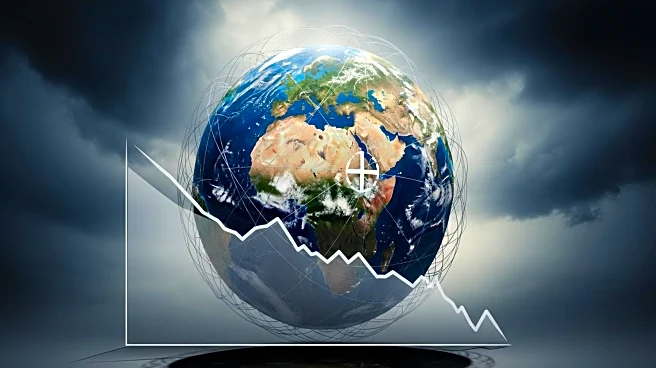What is the story about?
What's Happening?
The United Nations has reimposed sanctions on Iran over its nuclear program, further exacerbating the country's economic challenges. These sanctions, reinstated through the 'snapback' mechanism of the 2015 nuclear deal, freeze Iranian assets abroad, halt arms deals, and penalize the development of Iran's ballistic missile program. Iran's economy is already under significant strain, with the rial currency at a record low, leading to increased food prices and daily hardships for its citizens. The sanctions come amid concerns of renewed conflict between Iran and Israel, as missile sites damaged in a recent war are reportedly being rebuilt. Additionally, there is a growing fear of repression within Iran, with reports of increased executions this year.
Why It's Important?
The reimposition of sanctions on Iran is significant as it further isolates the country economically and politically. The sanctions are likely to exacerbate the already dire economic situation in Iran, where inflation and food prices are soaring, affecting the daily lives of its citizens. The move also heightens tensions in the region, with potential implications for international security, particularly concerning Iran's nuclear capabilities. The sanctions could lead to increased instability within Iran, as economic hardship often fuels social unrest and political dissent. Furthermore, the decision by France, Germany, and the UK to trigger the snapback mechanism reflects a critical stance against Iran's nuclear activities, potentially influencing future diplomatic relations.
What's Next?
Iran's response to the reimposed sanctions remains uncertain, but it has already recalled its ambassadors to France, Germany, and the UK for consultations. The U.S. Secretary of State has indicated that diplomacy remains an option, provided Iran agrees to direct talks. However, the lack of inspections by the International Atomic Energy Agency increases the risk of miscalculation, potentially leading to further military actions by the U.S. or Israel. The international community will be closely monitoring Iran's actions and any developments in its nuclear program, as well as the broader geopolitical implications of the sanctions.
Beyond the Headlines
The sanctions on Iran highlight the complex interplay between international diplomacy and domestic politics. The economic strain on Iran could lead to significant social and moral consequences, as citizens face increasing hardships. The surge in executions within Iran points to a shrinking political and civic space, raising concerns about human rights and the future of civil society in the country. The situation underscores the challenges faced by the Iranian people, who aspire for change within a rigid theocratic system.

















